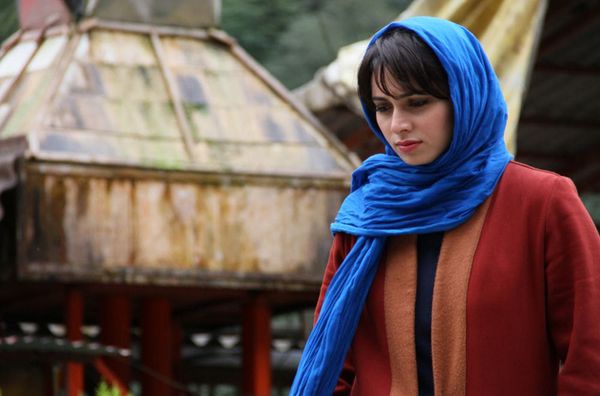 |
| Pegah Ahangarani, who has recently been jailed in Iran, as Farnaz in Kami's Party |
I spoke to Ahmadzadeh about the film - and Iranian filmmaking - in Tallinn, where it had its world premiere this week at the Black Nights Film Festival.
Amber Wilkinson: In the director's statement for the film, you say there is no "ideological statement" in the film but there's a fairly big metaphor in the boot of the car that they are driving around in. Could you talk about the fact that the name of the dead man is Omid, which means hope in Persian.
Ali Ahmadzadeh: Lots of us in the younger generation have dead hope in Iran. We are waiting a lot, maybe for a miracle, for something to happen - it may happen but it may not happen at all.
AW: How hard was it for you to make the film? I know there is a strong creative underground in Iran.
AA: It takes lots of effort to make these kind of underground movies. I've spent three years making it, a lot of the time I was waiting for the committee to give me the certificate for making the movie and probably showing it as well - that didn't happen. Later on, I had to spend a lot of time finding the funding for it, so it's really difficult and time-consuming.
AW: How hard is it for directors in general in Iran, because there's always the risk of you being arrested and some filmmakers have even left the country and can't go back legally because of their films?
AA: Generally, it's risky in Iran to make movies for any filmmaker working independently. But I haven't tried to say anything very bad about Iran, so that I would be arrested. I don't want to do that, to tell people that Iran is a really bad place to live. It's not something that has crossed the boundaries, so that this [being arrested] would happen to me. I just want to show one group of people - that they just want to be happy, to party and that they have this different type of lifestyle. In my opinion, the Iranian government should be proud of this movie and even like it because there are many movies that are made about Iran showing the problems and the dark part but now I'm showing the modern part, the lives of people who are happy and have nice, interesting lives.
AW: Can you tell me a bit about the role of women in the film - particularly having the two women having a lot of conversation on their own. Quite often Iranian films seem to be more male dominated or have men involved in most of the scenes?
AA: These things and this kind of life is becoming really normal, at least in the big cities, like Tehran. It's not shown a lot but there's nothing particularly unusual in them taking the guy they don't know with them in the car and they have open conversations with him. They use drugs and drink. In Iran, there are lots of things underground, which is why you may not have heard about it or are not aware of it. Our lives at home, privately, are very similar to yours, it's just in the street that things look a bit different.
AW: Is it ever difficult to get the actors to be in the film because of the type of film and because they would be worried about being associated with it?
AA: Independent cinema is not only the filmmaker, they are also a part of this independent cinema, so they help it and support it. They take less money and sometimes no money at all, so they take this risk and want to support this type of cinema. It is true that actors and actresses are not allowed to act in the movies that don't have a certificate but they take a risk. One of the actresses, Ahangarani, has already had some problems [she was sentenced to 18 months in jail last month for woolly sounding charges including "action against national security and links to foreign media.", although this is not in connection with Kami's Party] .It could be that they would be questioned about why they acted in this movie.
AW: Is the film going to be shown in Iran?
AA: It's really far from my thoughts, I don't think so.
AW: But do you think it will be shown privately there?
AA: There are some underground places where directors can arrange private shows. But they are definitely underground and the government would not really like to show this part of life in Iran.
AW: Are you now planning more films?
AA: This movie is going its own way now and I'm planning to start my next.





















